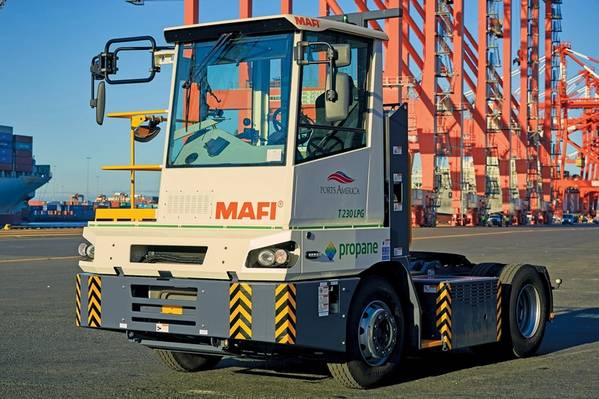
Cleaning up diesel emissions in ports is attainable now with new propane yard tractor technology.
The pressure is on for port authorities and tenants to develop realistic emissions reduction plans. Diesel is a mainstay in most ports and a primary cause of air pollution, making removing heavy-duty diesel equipment one of the most challenging steps in a clean air action plan.
While near-zero emission port equipment options are slim, a new study shows there is one energy source available now that is proven to be up to 99 percent cleaner than diesel: propane. As a clean, low carbon, and widely available alternative energy source, propane has been serving the needs of millions of Americans in a wide variety of applications for more than 100 years.
The study, conducted by the Propane Education & Research Council in partnership with Energy Environmental Analytics (E2A) at the Port Newark Container Terminal (PNCT), collected yard tractor emissions data. Researchers evaluated two yard tractors, one powered by propane and the other fueled by diesel, engaged in normal operations throughout the terminal.
The results confirm the propane-powered tractor yielded 99 percent fewer nitrogen oxide (NOx) composite and idle emissions than the diesel tractor. Additionally, the propane tractor produced 77.5 percent fewer THC idle emissions, 14 percent fewer brake-specific carbon dioxide emissions, and 75 percent fewer TPM emissions than its diesel counterpart.
The propane tractor that was tested is manufactured by MAFI and powered by Power Solutions International’s (PSI) 8.8-liter propane engine, which is over 90 percent cleaner than mandated U.S. Environmental Protection Agency (EPA) standards. It’s also certified to the optional ultra-low NOx emissions standard as defined by the California Air Resources Board (CARB) for heavy-duty engines with .02 grams of per brake horsepower-hour.
The findings in this study are groundbreaking for the port industry. Not only did the propane tractor surpass emissions expectations, it also met the diesel power output. The engine provides 270 horsepower with 565 lb-ft of torque. The results are clear: adopting propane-powered near-zero emission technologies such as tractors in ports will reduce criteria pollutants fast without compromising port workflow.
Renewable propane providing more clean energy options
Clean propane engine technology becomes even cleaner when new innovations like renewable propane are used. Renewable propane offers the same benefits as conventional propane—reliability, portability, and power—but with the added benefit of even further reduced emissions when compared with other energy sources.
Renewable propane’s chemical structure and physical properties are the same as traditional propane, meaning it can be used for all the same applications without sacrificing on performance. Plus, the combustion of renewable propane is net carbon neutral and does not contribute to elevated atmospheric carbon levels.
Made from a variety of renewable feedstocks such as camelina plant oil, vegetable oil, animal fats, or used cooking oil, renewable propane can be used alone or in innovative blends with other renewable or low-carbon energy sources to further reduce carbon emissions without sacrificing on performance.
For port authorities already operating with propane, renewable propane can be used in existing engines without modification. Additionally, the infrastructure is the same as traditional propane. If all infrastructure requirements are up to code, renewable propane and innovative blends with conventional propane can be easily added to a fleet.
Getting started with propane
The transition to propane is simple and affordable. With the help of a propane supplier, port authorities and tenants can map out a clean equipment transition plan. The first step is to engage an equipment manufacturer to discuss available propane options and to reach out to a local propane supplier to discuss refueling infrastructure.
Fortunately, propane infrastructure is customizable and scalable to meet the needs of any operation, regardless of size. Your local propane supplier can assist with developing the appropriate infrastructure needs for your site, including private stations that include a tank and dispenser. In many cases, a supplier may cover the cost of infrastructure in exchange for a mutually beneficial fuel contract that locks in a price per gallon for a specific time period. Ports that don’t yet have infrastructure plans can also take advantage of mobile refueling, which utilizes a propane bobtail delivery truck to refuel equipment on a customized schedule.
There are several local and federal financial incentives available to make the already affordable transition to propane even more attainable. Ports can apply for funding for equipment from the Maritime Administration and through the Diesel Emissions Reduction Act (DERA). Propane-powered port tractors also qualify for federal and state tax credits and incentives.
There is no singular path to decarbonization or one energy source to do it all. Fortunately, propane is a clean energy option available now to ports to satisfy emissions reduction requirements and continue down the wide path to achieving a low-carbon future.


